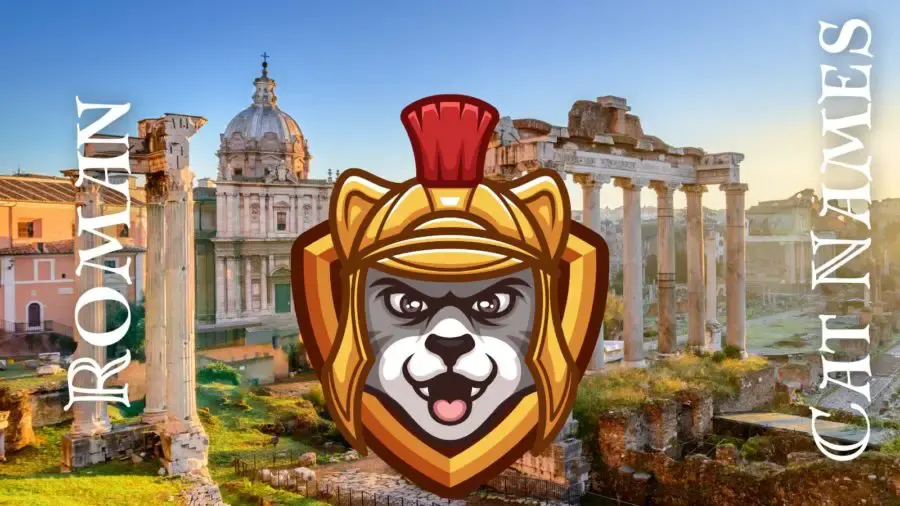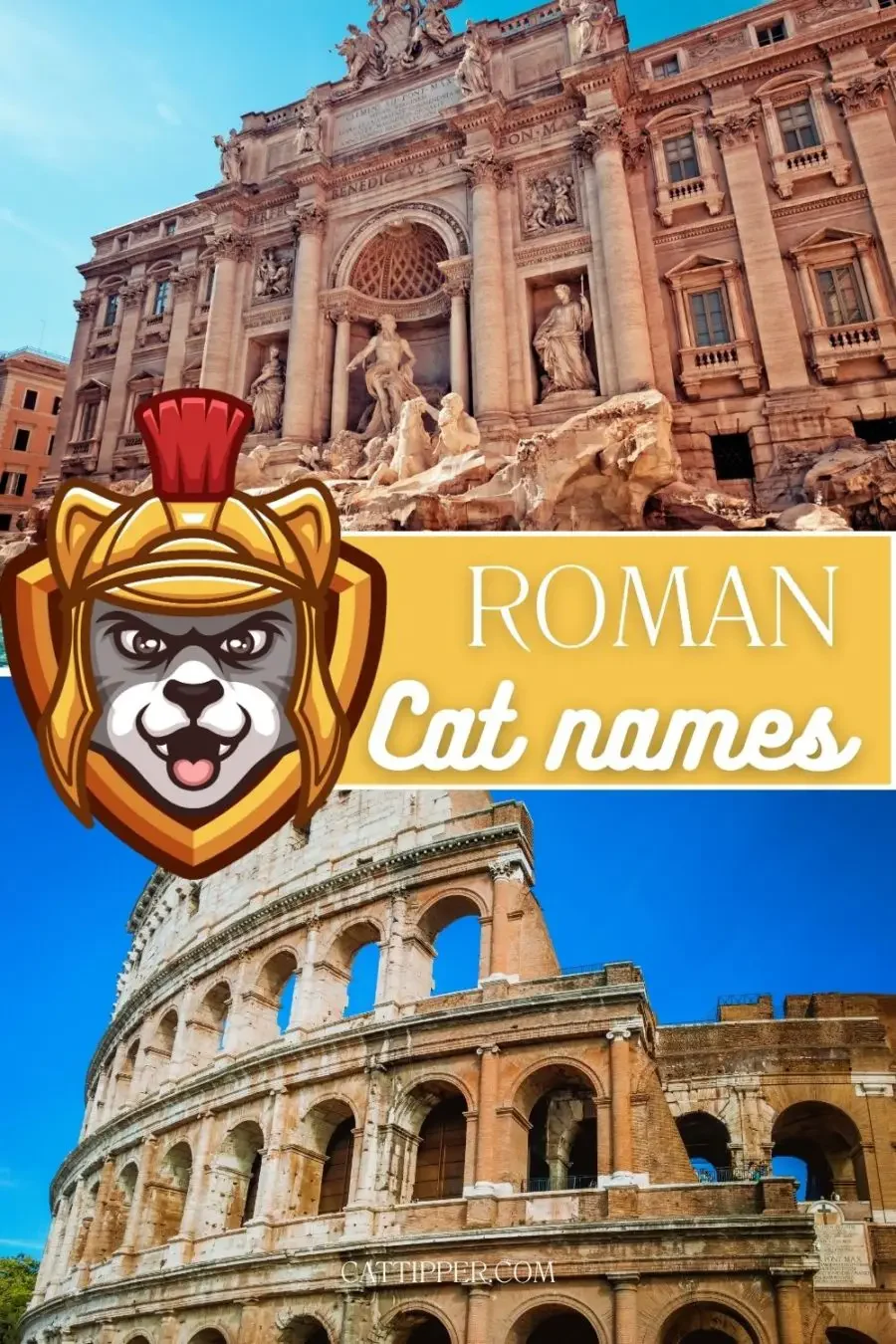“Friends, Romans, countrymen, lend me your cats!” OK, maybe Mark Anthony did not say exactly those words…but there’s no doubting that Rome has long had a connection with cats. Today’s visitors enjoy spotting the famous cats of the Roman Forum–and just might decide to bestow one of the many Roman cat names on their next furry family member.
From historic Roman figures to modern street names, we’ve rounded up some of the best names that comes straight from the Eternal City and the ancient Roman civilization.

Words Often Associated with Rome
- Caesar
- Chariot
- Empire
- Forum
- Gladiator
- Legion
- Pantheon
- Pax
- Piazza
- Roma
- Roman
- Senate
- Tiber
- Toga – a fun name for a white cat!
What does the name Rome mean?
Want to name your cat for the city itself? Whether you opt for Rome, Roma or Roman, here’s a look at the meaning of this city name.
The name “Rome” originates from the Latin name “Roma,” which refers to the ancient city and capital of Italy. The exact meaning of the name “Roma” is uncertain, but there are a few theories.
One possibility is that it derives from the Etruscan word “rumon,” which means “teat” or “breast.” The Roman myth of Romulus and Remus explained that the twins were nursed by a she-wolf. The twins eventually decided to found a city; during an argument, Romulus killed Remus then named the city for himself.
Another theory suggests that the name “Roma” is related to Ruma, the Etruscan name for the city on the Rumon, now Tiber, River.
Cat Names Inspired by Movies Set in Rome
Angel and Demon from Angels & Demons (2009) – Based on Dan Brown’s novel, this mystery-thriller follows a Harvard symbologist as he unravels a conspiracy in Rome involving the Vatican and an ancient secret society. A fun set of names for cat siblings!
Bellezza from La Grande Bellezza (2013) – Get a unique twist on the always-popular “Bella” with Bellezza or “beautiful.” This movie explores the existential journey of a writer reflecting on life, love, and art while living in Rome.
Ben-Hur from Ben-Hur (1959) – A grand epic set in ancient Rome, following the story of a Jewish prince who becomes a charioteer and seeks revenge against his adoptive brother.
Decimus from Gladiator (2000) – A historical epic starring Russell Crowe, portraying a Roman general named Maximus Decimus Meridius who seeks vengeance against the corrupt emperor Commodus in ancient Rome.
Dolce from La Dolce Vita (1960) – Directed by Federico Fellini, this iconic film follows a journalist as he navigates the glamorous and decadent nightlife of Rome.
Princess Anne from Roman Holiday (1953) – A classic romantic comedy featuring Audrey Hepburn as a princess who escapes her royal obligations and explores Rome with an American journalist, played by Gregory Peck.
Names of Historic Romans
Augustus – A powerful name for a regal and majestic cat, named after the first Roman Emperor.
Cassius – A name with a touch of mystery and intelligence, inspired by the Roman senator known for his role in the assassination of Julius Caesar.
Cicero – A great choice for a vocal and eloquent cat, named after the famous Roman philosopher, lawyer, and orator.
Constantine – An ideal name for a resilient and steadfast cat, paying homage to the Roman Emperor who converted to Christianity and founded Constantinople.
Julius – A strong and dignified name for a leader-like cat, honoring the renowned Roman general and statesman, Julius Caesar. Caesar would also make a strong name.
Marcus Aurelius: A philosopher-king and the last of the Five Good Emperors, known for his writings on Stoic philosophy and his reign during the height of the Roman Empire.
Maximus – Perfect for a powerful and dominant cat, reminiscent of the Latin word for “greatest” and associated with powerful Roman generals.
Nero – A name that exudes a bit of mischief and playfulness, inspired by the infamous Roman Emperor known for his eccentricity.
Octavia – An elegant and graceful name, suitable for a sophisticated and refined female cat, inspired by Octavia Minor, the sister of Augustus.
Pliny the Elder: A naturalist, author, and naval commander known for his comprehensive work Natural History, which served as an influential encyclopedia of knowledge in ancient Rome. A fun Roman name if you are adopting an older cat.
Pompey – A name for a courageous and adventurous cat, referencing Gnaeus Pompeius Magnus, a skilled Roman military general.
Seneca: A philosopher, statesman, and advisor to Emperor Nero, known for his Stoic teachings and his contributions to Roman literature.
Spartacus: A gladiator and leader of the slave rebellion against the Roman Republic, symbolizing resistance against oppression and a quest for freedom.
Tiberius – A strong and authoritative name for a cat with a commanding presence, derived from the name of the second Roman Emperor.
Virgil: The renowned poet is best known for his epic poem The Aeneid, which tells the legendary story of Aeneas and the foundation of Rome.
Titles from Ancient Rome
Want to bestow a title on your new cat? Here’s your chance! These titles were used in Ancient Rome for a variety of offices:
Emperor: The title given to the supreme ruler of the Roman Empire. Emperors held absolute power and authority over the empire.
Caesar: Initially a family name, it became a title used by subsequent emperors, signifying their connection to Julius Caesar and their claim to imperial power.
Princeps: A title used by the early emperors, meaning “first citizen” or “leading citizen,” to emphasize their position as the foremost among equals.
Imperator: A title originally given to successful military commanders, later adopted by emperors as a symbol of their military authority and triumphs.
Pontifex Maximus: The title of the chief priest in ancient Rome, later assumed by emperors to showcase their role as the highest religious authority.
Consul: The highest elected office in the Roman Republic, held by two individuals who jointly ruled for a year. Some emperors maintained the title of consul even after the establishment of the empire.
Tribune: An office in the Roman Republic that represented the interests of the plebeians or common people and held the power to veto certain decisions. The title was sometimes used by emperors to connect with the common people.
Roman Goddess Names for Your Cat
Aurora: The goddess of dawn, associated with the rising of the sun and the new beginnings that each day brings.
Bona Dea: The goddess of fertility, healing, and women, worshipped in secret rites by Roman women for protection and blessings.
Ceres: The goddess of agriculture, grain, and fertility, associated with a bountiful harvest and the nurturing of life.
Diana: The goddess of the hunt, the moon, and childbirth, revered as a protector of wild animals and a guardian of women.
Discordia: The goddess of discord and strife, symbolizing the chaos and conflicts that can arise among mortals.
Fides: The goddess of faith and trust, revered as the personification of loyalty and honesty in relationships and agreements.
Flora: The goddess of flowers and springtime, celebrated for her association with blooming plants and the renewal of nature.
Fortuna: The goddess of luck, fortune, and fate, worshipped for her ability to bestow both good and bad fortune upon mortals.
Hecate: A goddess associated with witchcraft, magic, and the night, revered for her knowledge of herbs and her role as a guide at crossroads.
Iris: The goddess of the rainbow and messenger of the gods, known for her role in delivering divine messages to mortals.
Juno: The queen of the gods and goddess of marriage, childbirth, and the family, revered as a protector of women and the guardian of the Roman state.
Luna: The goddess of the moon, symbolizing its gentle and serene light, as well as its influence over the tides and cycles of nature.
Minerva: The goddess of wisdom, strategic warfare, and crafts, associated with intelligence, creativity, and strategic thinking.
Proserpina: The goddess of the underworld and queen of the dead, associated with the cycle of life, death, and rebirth.
Venus: The goddess of love, beauty, and fertility, celebrated as the embodiment of feminine allure and the patroness of romantic relationships.
Vesta: The goddess of the hearth and home, honored as the guardian of the sacred fire and the center of domestic life.
Victoria: The goddess of victory, worshipped as a symbol of triumph and success in both military and civilian endeavors.
Roman God Names for Your Cat
Apollo: The god of music, poetry, and healing, associated with light and the sun.
Bacchus: The god of wine, revelry, and ecstasy, known for his wild and joyful celebrations.
Cupid: The god of love and desire, often depicted as a mischievous cherub with a bow and arrows.
Janus: The god of beginnings, transitions, and doorways, depicted with two faces looking in opposite directions.
Jupiter: The king of the gods and god of the sky and thunder, associated with power and authority.
Mars: The god of war, known for his valor and military prowess.
Mercury: The messenger of the gods and god of commerce, travel, and communication, depicted with winged sandals and a caduceus.
Neptune: The god of the sea, earthquakes, and horses, known as the ruler of the oceans.
Pluto: The god of the underworld, associated with death and the afterlife.
Saturn: The god of agriculture and time, often depicted with a sickle and associated with abundance and the harvest.
Sol: The god of the sun, symbolizing warmth, light, and life-giving energy.
Vulcan: The god of fire, metalworking, and craftsmanship, associated with volcanoes and the forge.
Latin Names for an Entire Litter!
Needs Roman names for an entire litter of kittens–or more? Here are the Latin praenomens (given names) for first through tenth in a family. These are also fun names to indicate your first cat, second, etc.
- Primus – First
- Secundus – Second
- Tertius – Third
- Quartus – Fourth
- Quintus – Fifth
- Sextus – Sixth
- Septimus – Seventh
- Octavius – Eighth
- Nonus – Ninth
- Decimus – Tenth
Ancient Roman Names and their Meanings
Cornelia – Derived from the Roman family name Cornelia, it is associated with the Latin word “cornu” meaning “horn.”
Flavia – A feminine name derived from the Roman gens Flavia, it is associated with the Latin word “flavus” meaning “golden” or “yellow-haired.”
Gaius – A common Roman praenomen, Gaius is of uncertain origin. Some suggested meanings include “rejoice,” “glad,” or “joyful.”
Livia – Derived from the Roman family name Livius, Livia is associated with the Latin word “lividus” meaning “bluish” or “envious.”
Lucia – Derived from the Latin word “lux” meaning “light,” Lucia means “light” or “illumination.”
Marcus – Meaning “warlike,” Marcus was a popular given name in ancient Rome.
Octavia – A feminine name derived from the Latin word “octavus” meaning “eighth,” Octavia was often given to the eighth-born child.
Quintus – Derived from the Latin word “quintus” meaning “fifth,” Quintus was a popular Roman praenomen given to the fifth-born child.
Titus – Meaning “title of honor” or “defender,” Titus was a common Roman praenomen.
Valerius – Derived from the Latin word “valere” meaning “to be strong,” Valerius means “strong” or “healthy.”
Popular Roman Names for Boys
Alessandro – A classic name derived from the Greek name Alexander, meaning “defender of men.
Andrea – A unisex name with biblical origins, meaning “manly” or “strong.
Davide – The Italian form of David, a name with Hebrew origins meaning “beloved.”
Federico – Derived from the Germanic name Friedrich, meaning “peaceful ruler.”
Giovanni – The Italian form of John, meaning “God is gracious.”
Leonardo – A name associated with the famous Italian polymath Leonardo da Vinci, meaning “brave lion.”
Matteo – The Italian form of Matthew, meaning “gift of God.”
Riccardo – The Italian form of Richard, meaning “brave ruler” or “strong ruler.”
Stefano – The Italian form of Stephen, meaning “crown” or “crowned one.”
Tommaso – The Italian form of Thomas, meaning “twin.”
Popular Girl’s’ Names in Rome
Alessia – A variant of Alessandra, meaning “defender of mankind.”
Chiara – Derived from the Italian word for “clear” or “bright,” symbolizing purity and clarity.
Elena – The Italian form of Helen, meaning “bright” or “shining light.”
Francesca – A popular name of Italian origin, meaning “free” or “from France.”
Giulia – The Italian form of Julia, meaning “youthful” or “downy.
Isabella – Derived from the Hebrew name Elisheba, meaning “God is my oath,” it is a popular name associated with nobility and beauty.
Laura – Derived from the Latin word for “laurel,” a symbol of victory and honor.
Martina – A feminine form of Martin, meaning “warrior” or “dedicated to Mars.
Sofia – The Italian form of Sophia, meaning “wisdom” or “knowledge.”
Valentina – Derived from the Latin word for “strong” or “healthy,” symbolizing vitality and strength.
Tourist Attractions that Make Good Names

Colosseum: A powerful and awe-inspiring name for a strong and majestic cat, reminiscent of the iconic Roman amphitheater. (Can you spot the cat in a photo we took on our visit, above?)
Forum: A name that signifies history and importance, suitable for a cat with a regal and commanding presence, reminiscent of the center of ancient Roman public life.
Pantheon: A name that denotes wisdom and knowledge, perfect for a wise and intelligent cat, inspired by the ancient Roman temple dedicated to all the gods.
Peter: St. Peter’s Basilica, a name associated with grandeur and spirituality, is fitting for a cat with a dignified and serene nature, referencing the magnificent basilica in Vatican City.
Piazza: The word “piazza” refers to a public square or open space, a central gathering place for socializing, events, and activities.
Sistine: The term “Sistine” refers to something related to the Sistine Chapel or its famous ceiling painted by Michelangelo. The name “Sistine” is often associated with creativity, artistic excellence, and religious significance due to its connection to this remarkable work of art.
Trevi: The Trevi Fountain features Neptunus Rex, since 1762 a silent witness to a steady stream of tourists. While sightseers are not allowed to frolic in the pooling waters a la Anita Ekberg in La Dolce Vita, the approximately 3,000 Euros that collect each day at the bottom of the fountain is testimony to the fact that visitors often act out a scene from another cinema treasure, Three Coins in the Fountain— tossing money into the fountain to ensure their return trip to the Eternal City.
Names Derived from the Seven Hills of Rome
Are you naming multiple kittens? Here are the names of the seven hills of Rome that would offer your furry family members a connection to the city’s history and imbue your cat’s name with a sense of grandeur and cultural significance.
Aventinus: The Aventine Hill is known for its lush greenery and serene atmosphere, making it an ideal name for a cat with a calm and peaceful demeanor.
Caelius: The Caelian Hill offers stunning views of the city and is associated with luxury and elegance, making it a fitting name for a sophisticated and regal cat.
Capitolinus: A majestic name for a regal cat, referencing the Capitoline Hill, the most important hill in ancient Rome
Esquilinus: The Esquiline Hill is known for its historical significance and diverse architecture, making it a suitable name for a curious and adventurous cat with a penchant for exploration.
Palatinus: The Palatine Hill is associated with wealth, opulence, and the Roman emperors, making it a grand and majestic name for a cat that exudes regality and grace.
Quirinalis: The Quirinal Hill has a rich history and is now home to the official residence of the President of the Italian Republic, making it a distinguished and authoritative name for a cat with a commanding presence.
Viminalis: The Viminal Hill is the smallest of the seven hills but still holds significance as part of Rome’s ancient landscape, making it a unique and understated name for a cat with a quiet yet intriguing personality.
Famous Streets of Rome
Appia – A name that evokes a sense of adventure and exploration, inspired by Via Appia, the famous Appian Way, the ancient road connecting Rome to southeastern Italy.
Flaminia – A graceful and elegant name, inspired by Via Flaminia, one of the oldest and most important Roman roads.
Sacra – A name with a sense of grandeur and history, referencing Via Sacra, the Sacred Way, the main street in ancient Rome that led to the Capitoline Hill.
Tiburtina – A melodic and exotic name, referencing Via Tiburtina, an ancient road that connected Rome to the city of Tibur (modern-day Tivoli).
Trastevere – A charming and bohemian name, inspired by the vibrant neighborhood located across the Tiber River in Rome.
More Cat Names You Might Like
Astrology Cat Names {Based on Your Cat’s Zodiac Sign!}
Mermaid Cat Names for Your New Feline Friend
Pin it to remember

- 🎉 GIVEAWAY: Lord of the Pets Portrait of Your Cat! - November 26, 2024
- Review: Lord of the Pets Cat Portraits! - November 26, 2024
- Cat Adoption: FAQ You Might Have - June 28, 2024
